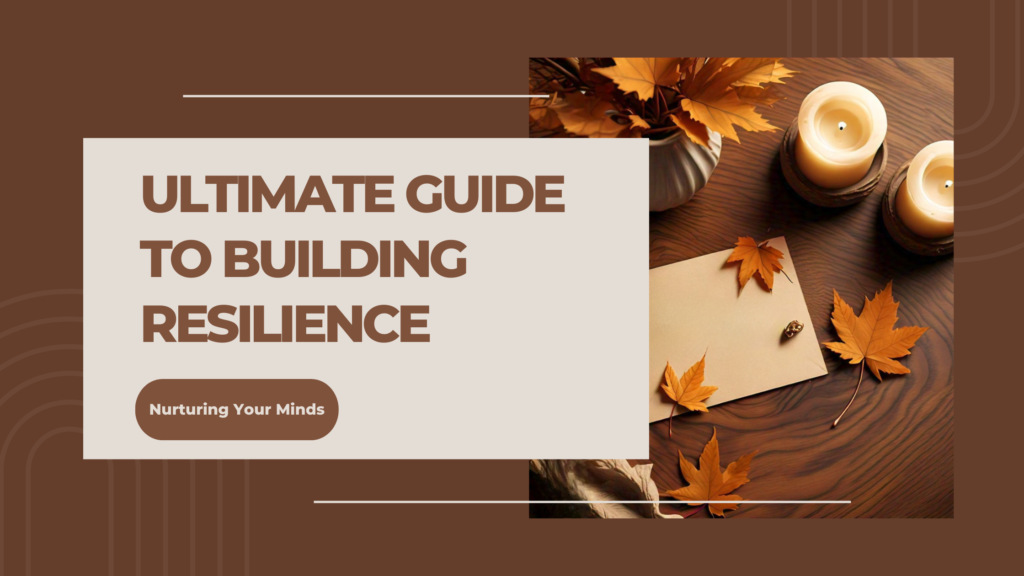“Life is a rollercoaster with exciting highs and stressful lows. What if I told you that you can learn to enjoy the ride, no matter how wild the journey gets? Here’s the art of building resilience; a superpower you can cultivate to not just survive, but thrive through life’s challenges.”
The Power of Resilience: Introduction you must know
Resilience is often described as the ability to bounce back from adversity, but it’s much more than that. It’s the capacity to adapt positively in the face of stress, trauma, or setbacks. It’s the inner strength that helps you navigate through life’s storms and emerge stronger on the other side. In today’s fast-paced world, building resilience isn’t just beneficial, it’s ESSENTIAL for maintaining mental health and overall well-being.
In this comprehensive guide, we’ll delve into what resilience is, why it’s crucial, and practical strategies for cultivating it. Whether you’re facing personal challenges, professional setbacks, or just the everyday stressors of life, these insights will help you build a robust foundation of resilience to face whatever comes your way.
What Resilience actually is?
Resilience is more than just bouncing back. It’s the ability to grow and improve through challenges. We psychologists define resilience as a process of adapting well in the face of adversity, trauma, tragedy, threats, or significant sources of stress. It involves behaviors, thoughts, and actions that can be developed and strengthened over time.
The Science behind Resilience
Understanding the science of resilience can provide valuable insights into HOW and WHY it works. Research indicates that resilience involves several key factors:
- Neuroplasticity: Our brains are capable of changing and adapting throughout our lives. Neuroplasticity allows us to rewire our brain pathways, which can enhance our ability to cope with stress and adversity.
- Emotional Regulation: Resilient individuals often have a strong grasp of their emotions. They are able to manage their feelings effectively, preventing negative emotions from overwhelming them.
- Social Support: Building and maintaining strong relationships with family, friends, and communities can provide a crucial support network during tough times.
- Optimism and Positive Thinking: A positive outlook can influence resilience. Optimistic individuals are more likely to approach challenges as opportunities for growth rather than obstacles.

Why Does Resilience Matter?
Before implementing something into our lives, we must know its importance first, just like we do study more in our examination days and not in regular days, just because we know the IMPORTANCE of exams! So, let’s look into the importance of resilience first.
Resilience is vital for several reasons:
- Enhanced Mental Health: Resilience can help protect against mental health issues such as depression and anxiety. It allows individuals to navigate stress more effectively and maintain emotional balance.
- Improved Problem-Solving: Resilient people are better equipped to handle problems and come up with effective solutions. They approach challenges with a proactive mindset rather than feeling overwhelmed.
- Greater Life Satisfaction: Building resilience can lead to higher levels of life satisfaction. It helps individuals find meaning and purpose even in difficult circumstances.
- Increased Adaptability: Resilience enhances our ability to adapt to change. In an ever-changing world, being adaptable is crucial for personal and professional success.
Not practicing for building resilience can lead you to not being capable enough to deal and cope with daily life challenges and stressors. And if you are experiencing any kind of stress, HERE is my detailed, interesting yet beneficial De-Stress Nurturing Program.
Practical Strategies for Building Resilience
Develop a Growth Mindset
A growth mindset, a term coined by psychologist Carol Dweck, refers to the belief that abilities and intelligence can be developed through effort and learning. Embracing a growth mindset can significantly boost resilience by encouraging you to view challenges as opportunities for growth rather than as fixed limitations.
How to Cultivate a Growth Mindset:
-
- Embrace Challenges: Approach difficulties as chances to learn and improve.
- Learn from Criticism: Use constructive feedback as a tool for growth rather than a setback.
- Celebrate Effort: Focus on the effort you put in, not just the outcome.
Practice Self-Care
Self-care is not just about pampering yourself; it’s about maintaining your physical, emotional, and mental health. Regular self-care can provide a strong foundation for resilience.
Self-Care Tips:
-
- Exercise Regularly: Physical activity can boost your mood and energy levels.
- Eat a Balanced Diet: Proper nutrition supports both physical and mental health.
- Get Enough Sleep: Quality sleep is essential for stress management and overall well-being.
- Engage in Relaxation Techniques: Practices like meditation, deep breathing, and yoga can reduce stress and improve emotional balance.
Self-Love is an essential part in order to become a resilient individual. Check out this interesting FREE step by step guide on SELF-COMPASSION and OPTIMISTIC MINDSET.
Build Strong Relationships
Social support is a crucial component of resilience. Building and maintaining strong relationships can provide emotional support, practical help, and a sense of belonging.
Tips for Strengthening Relationships:
-
- Connect Regularly: Make time to nurture your relationships through regular communication and activities.
- Seek Support: Don’t hesitate to reach out to friends, family, or support groups when you need help.
- Be a Supportive Friend: Offer support and understanding to others, creating a network of mutual support.
Develop Problem-Solving Skills
Effective problem-solving skills can enhance your ability to handle challenges and setbacks. Developing these skills involves a combination of critical thinking, creativity, and resilience.
Problem-Solving Strategies:
-
- Identify the Problem: Clearly define the issue you’re facing.
- Generate Solutions: Brainstorm possible solutions and evaluate their feasibility.
- Take Action: Implement the chosen solution and monitor its effectiveness.
- Reflect and Learn: Analyze the outcome and learn from the experience to improve future problem-solving.
Set Realistic Goals
Setting and achieving goals can provide a sense of purpose and accomplishment. It’s important to set SMART goals that are Specific, Measurable, Attainable, Relevant, and Time-bound.
Goal-Setting Tips:
-
- Break Goals into Smaller Steps: Large goals can be overwhelming. Breaking them into smaller, manageable steps can make them more achievable.
- Celebrate Milestones: Recognize and celebrate progress along the way to stay motivated.
- Adjust Goals as Needed: Be flexible and adjust your goals based on your progress and changing circumstances.
Cultivate Mindfulness
Mindfulness involves being present and fully engaged in the current moment. It can help you manage stress, reduce anxiety, and increase resilience.
Mindfulness Practices:
-
- Mindful Meditation: Practice mindfulness meditation to increase awareness and reduce stress.
- Deep Breathing Exercises: Use deep breathing techniques to calm your mind and body.
- Mindful Eating: Pay attention to the taste, texture, and enjoyment of your food to enhance your overall mindfulness.
Maintain a Positive Outlook
A positive outlook can significantly influence your resilience. Focusing on the positives, even in challenging situations, can help you maintain motivation and hope.
Tips for Staying Positive:
-
- Practice Gratitude: Regularly reflect on what you’re grateful for to shift your focus towards the positive aspects of your life.
- Challenge Negative Thoughts: Replace negative thoughts with positive affirmations and constructive self-talk.
- Surround Yourself with Positivity: Engage with people, activities, and environments that uplift and inspire you.
Learn from Setbacks
Setbacks are an inevitable part of life, but they also provide valuable learning opportunities. Reflecting on and learning from setbacks can strengthen your resilience and improve your ability to handle future challenges.
Steps for Learning from Setbacks:
-
- Analyze the Situation: Reflect on what went wrong and identify any contributing factors.
- Identify Lessons Learned: Determine what you can learn from the experience and how you can apply these lessons moving forward.
- Develop a Plan: Create a plan to address any issues and prevent similar setbacks in the future.
Seek Professional Help
Building resilience is a process that can benefit from professional guidance. Therapists, counselors, and coaches can provide valuable support and strategies for developing resilience.
When to Seek Help:
-
- Persistent Stress or Anxiety: If you’re struggling to manage stress or anxiety, professional support can be beneficial.
- Trauma or Crisis: For significant trauma or crises, seeking professional help can provide essential support and coping strategies.
- Ongoing Challenges: If you’re facing ongoing challenges and need guidance, a mental health professional can offer valuable insights and tools.
Embrace a Sense of Purpose
Having a sense of purpose can provide motivation and direction, even in the face of adversity. Identifying what gives your life meaning can enhance your resilience and overall well-being.
Ways to Find and Cultivate Purpose:
-
- Reflect on Your Values: Identify what matters most to you and align your actions with your core values.
- Set Meaningful Goals: Pursue goals that are aligned with your sense of purpose and bring fulfillment.
- Engage in Activities You Love: Participate in activities that bring joy and satisfaction to your life.
Resilience is the remarkable ability to adapt and thrive despite facing adversity and challenges. Resilience is not about avoiding stress but learning How to Respond Effectively and emerge stronger. It’s a testament to human strength and the power to overcome.
By embracing change and maintaining hope, individuals can navigate life’s difficulties with grace and determination.
SELF-HELP workbooks can help you build resilience in a more organized and stress-free manner.
Conclusion: Embracing Resilience
Building resilience is not a one-time effort but a lifelong journey. It involves developing skills, fostering positive relationships, and maintaining a mindset that embraces growth and learning. By incorporating these strategies into your life, you can enhance your ability to navigate challenges, bounce back from setbacks, and thrive in the face of adversity.
Remember, resilience is not about avoiding difficulties but about learning how to handle them with strength and grace. Embrace the journey, and with time and effort, you’ll find yourself not just surviving but thriving through life’s rollercoaster of experiences.
So, take a deep breath, adjust your mindset, and get ready to embrace the ride. Building resilience is your ticket to a stronger, more fulfilled life.
Remember: TAKING ACTION is the only key to your betterment and growth.
Take Action and see the magic!



